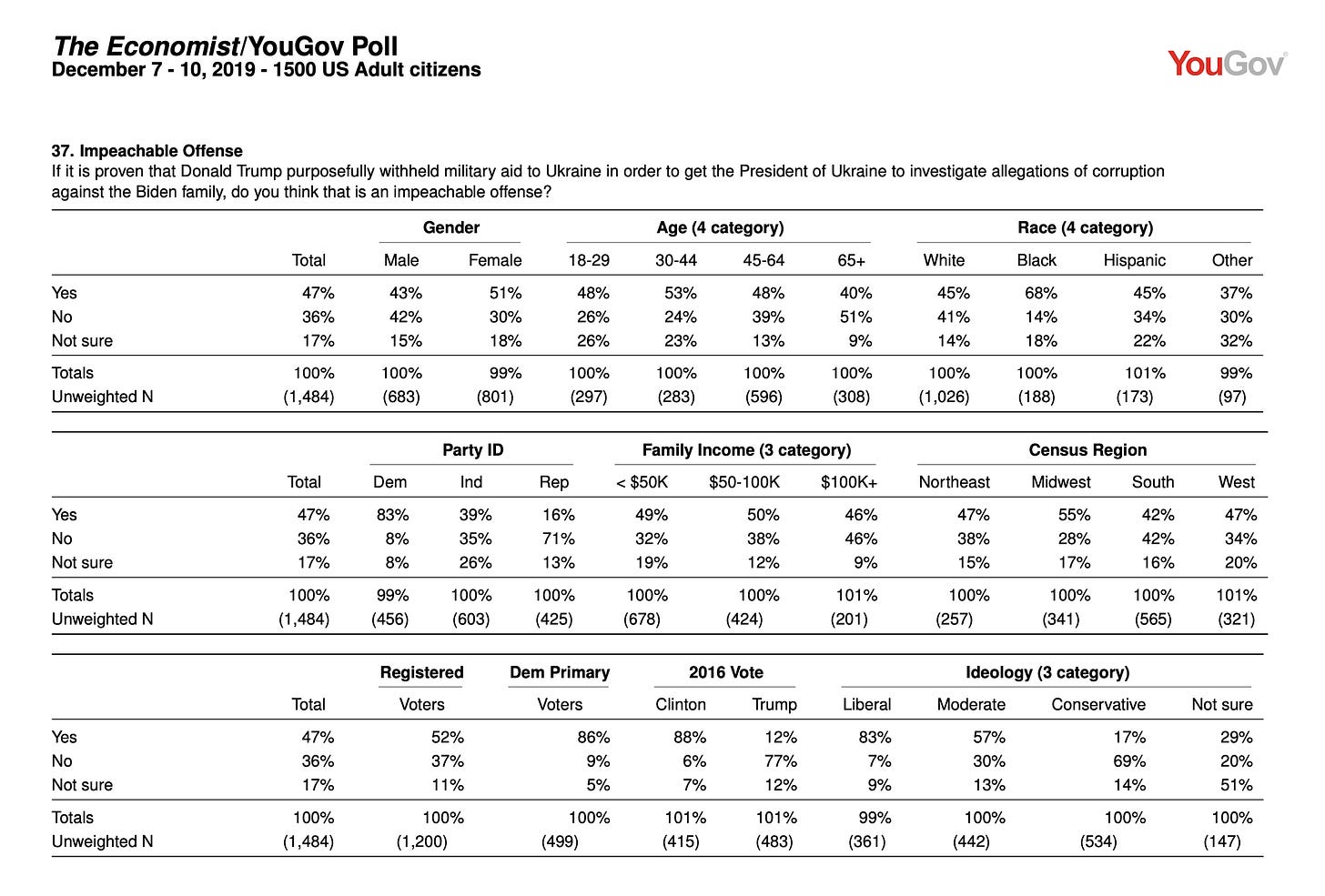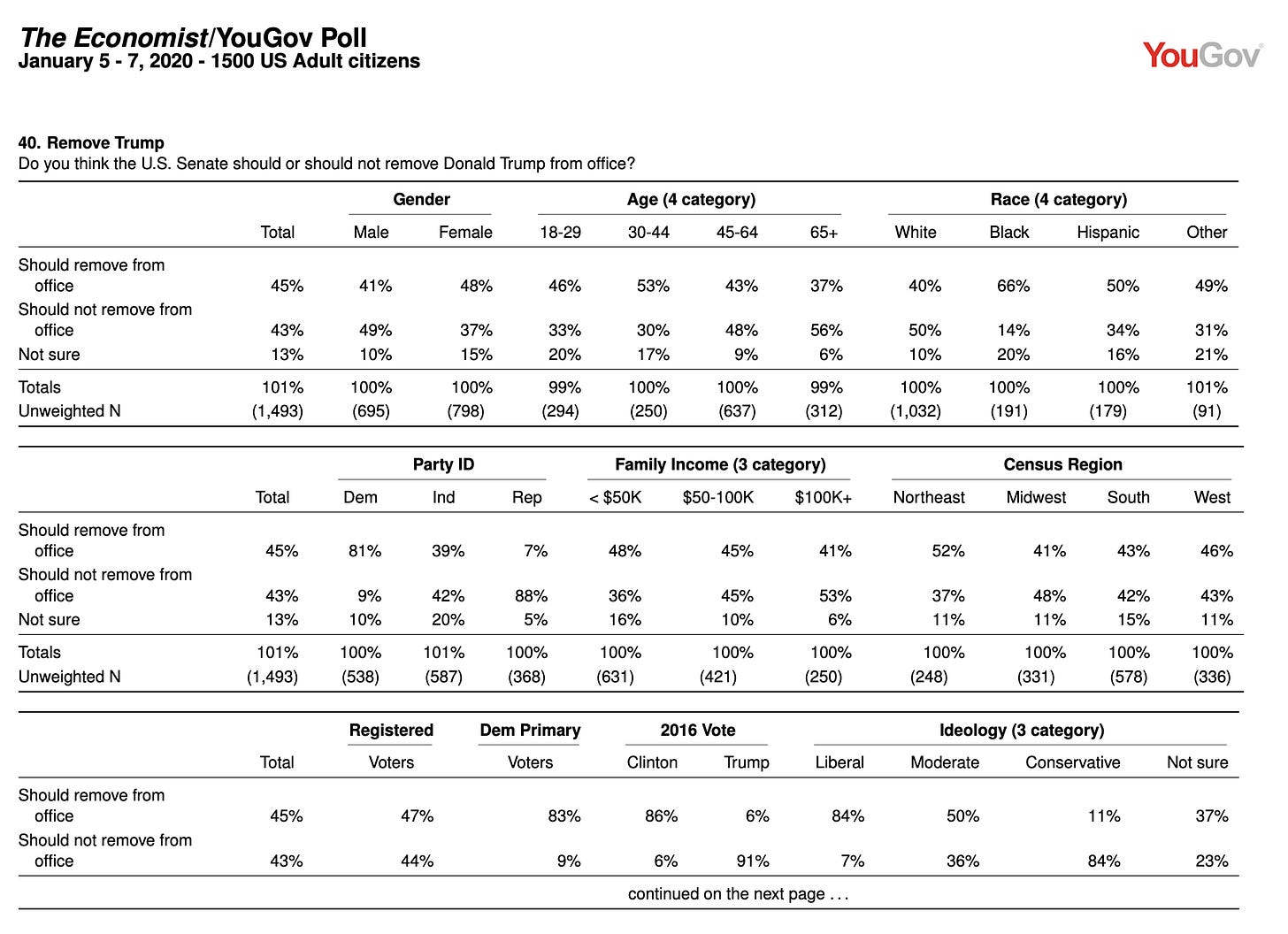January 19, 2020 📊 The impeachment sticking point
Elected officials should take public opinion into account. Will they?
Welcome! I’m G. Elliott Morris, data journalist for The Economist and blogger of polls, elections, and political science. Happy Sunday! This is my weekly email where I write about politics using data and share links to what I’ve been reading and writing. Thoughts? Drop me a line (or just respond to this email). Like what you’re reading? Tap the ❤️ below the title and share with your friends!
Dear Reader,
This week’s main read: I preview the 2020 impeachment trial with some polling on what voters think warrants the removal of the president.
Thanks all for reading my weekly email. Please consider sharing online and/or forwarding to a friend. The more readers, the merrier! If you’re shy, the best way you can support my newsletter is to press the heart button below the title (this makes it rank higher in Substack’s curation). If you’d like to read more of my blogging I publish subscriber-only content 1-3x a week on this platform. Click the button below to learn more!
—Elliott
The impeachment sticking point
Elected officials should take public opinion into account. Will they?
What is an impeachable offense? And should an executive be removed from office if they commit one?
That’s the question at the center of the debate over whether or not to remove the now-impeached sitting President of the United States from office. And with President Trump’s trial starting this week, that question will become only more salient—both in the media and to voters. So it’s worth asking the question: what constitutes an impeachable offense?
This is, of course, an unsettled question. The Constitution leaves much up to interpretation in its empowering the Congress against an executive’s “high crimes and misdemeanors”. Some have said the Founder’s language was intentionally broad; that they intentionally cast a wide net to encompass political offenses that the people decided warranted removal. So wrote C. M. Ellis for The Atlantic magazine in 1867:
Thus it appears that the political offences of the Constitution for which civil officers are removable embrace, besides the high crimes and misdemeanors of the criminal law, a range as wide as the circle of official duties and the influences of official position; they include, not only breaches of duty, but also misconduct during the tenure of office; they extend to acts for which there is no criminal responsibility whatsoever; they reach even personal conduct; they include, not merely acts of usurpation, but all such acts as tend to subvert the just influence of official position, to degrade the office, to contaminate society, to impair the government, to destroy the proper relations of civil officers to the people and to the government, and to the other branches of the government.
But the president’s supporters disagree. His lawyers appeared in interviews across cable news channels this weekend to argue that abuse of power and obstruction were not so severe as to warrant removal from office. (Of course, there is no legal precedent for this view.)
As I think the nitty-gritty is decided—by which I mean I believe the House rendered a fair judgment given the evidence of the president’s wrongdoing—I want to discuss a separate point about the role of the people in deciding removal. Public opinion ought to be considered, by both sides.
It is true that a president ought to removed if they committed an impeachable offense prima facie. In this view, impeachment is a punishment for a crime and removal the sentencing by the jury. But there is another view of impeachment—One that gives voters the power to check a president in the middle of his term, should he not turn out to be what they wanted. This is not necessarily divorced from the prior view, and certainly worthwhile to consider when orienting ourselves to how we hold a president to account.
This is not dissimilar to the ideas that early pollsters espoused when talking about their data as a means to hold politicians accountable between elections. Indeed, they likely intended polls to be used in cases similar to the one we are facing today.
So, what do the people think today, when there is an impasse between the two chambers of government that will decide the fate of the president?
Today, 47% of the public believe that President Trump should be impeached for withholding military aid in exchange for dirt on his political rivals. That figure comes from recent polling from The Economist and YouGov:

They think, by a roughly even split, that he should be removed for these crimes:

My point is plain, but important. Let’s take public opinion into account when deciding whether we should remove the president from office. They deserve such responsiveness from their elected officials.
And here are some selected links to the work I read and wrote last week:
Posts for subscribers:
January 19: How do we know that higher turnout benefits Democrats?
Preliminary thoughts on a new book that claims it doesn’t
Thanks for reading!
Thanks for reading. I’ll be back in your inbox next Sunday. In the meantime, follow me online or reach out via email. I’d love to hear from you!
If you want more content, I publish subscribers-only posts on Substack 1-3 times each week. Sign up today for $5/month (or $50/year) by clicking on the following button. Even if you don't want the extra posts, the funds go toward supporting the time spent writing this free, weekly letter. Your support makes this all possible!



